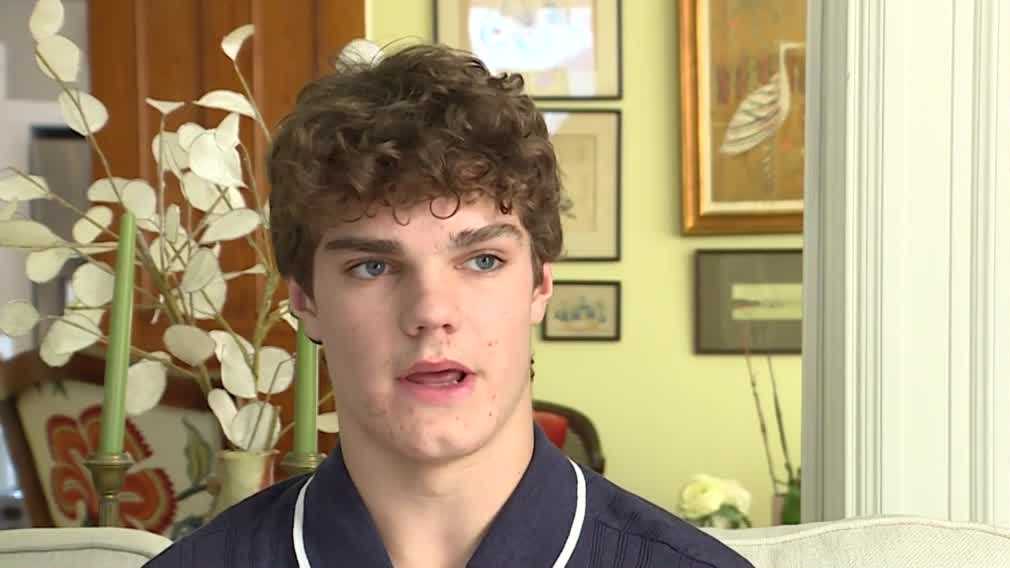CONCERN IN FOOTBALL HAS RAISED…. WITH STUDIES HIGHLIGHTING POTENTIAL LONG-TERM HEALTH HAZARDS. A BANGOR MAN IS TAKEING ACTION BY PLEDGEING TO DONATE HIS BRAIN TO RESEARCH INTO IMPROVING SAFETY IN THE NEXT GAME. FIONN PARKER- CUMMINGS DECIDED THAT WHEN HE DIES, HE WILL HAVE HIS BRAIN GO TO THE UNIVERSITY OF PITTSBURGH NATIONAL SPORTS BRAIN BANK.. HE IS THE YOUNGEST PERSON TO GET ON THIS COMMITTEE. HE HOPE THIS DONATION WILL ADVANCE THE UNIVERSITY’S RESEARCH INTO TRAUMATIC BRAIN INJURIES TO PROTECT FUTURE PLAYERS. KID II WHO DISCOVER FOOTBALL CAN TAKE A HELMET AND BE SAFE AND PLAY AND EXCELLENT AND ONE DAY HAVE A CHANCE TO PLAY IN COLLEGE OR NFL I WILL BE 100% . FIONN TO UNDERGO ANNUAL ASSESSMENTS WITH NATIONAL SPORTS BRAIN BANK FOR LIFE
Maine high school football player donates brain to science to help improve game safety
Bangor’s Fionn Parker-Cummings has pledged to donate his brain to the University of Pittsburgh’s National Sports Brain Bank, becoming the youngest person to make such a commitment.
Long after his playing days are over, Fionn Parker-Cummings, a senior at Bangor High School, hopes to leave a lasting impact on the sport he loves by making soccer safer for future generations. The high school wide receiver and cornerback has pledged to donate his brain to the University of Pittsburgh’s National Sports Brain Bank, becoming the youngest person to make such a commitment.” I thought, “What can I do? to help the football community advance science. and be safer?'” Parker-Cummings said. “And one day it came to me: maybe I should donate my brain.” Having experienced multiple concussions, Parker-Cummings wants to contribute to research that can protect athletes in all levels, from kids just picking up a helmet to professionals facing the risks of on-field injuries.” I’d like to help clarify some of the science around it,” he said. “If I can prevent injuries, even for a kid just discovering football, it means everything.” His father, Dr. Peter Cummings, is a neuroscientist and is proud of his son’s decision and supports his commitment. “He has always been active in promoting safety and fighting against football bans. was surprised given his passion for sports.” As part of his donation, Parker-Cummings will undergo annual assessments with the National Sports Brain Bank, which aims to advance research into traumatic brain injuries. A spokesperson of the organization expressed deep gratitude, saying Parker-Cummings’ pledge could bring crucial attention to this issue and inspire others to consider similar donations.
Long after his playing days are over, Fionn Parker-Cummings, a senior at Bangor High School, hopes to leave a lasting impact on the sport he loves by making soccer safer for future generations.
The high school wide receiver and cornerback has pledged to donate his brain to the University of Pittsburgh’s National Sports Brain Bank, becoming the youngest person to make such a commitment.
“I thought, ‘What can I do to help the football community advance the science and be safer?’ Parker-Cummings said. “And it came to me one day: maybe I should donate my brain.”
Having experienced multiple concussions, Parker-Cummings wants to contribute to research that can protect athletes at all levels, from kids just picking up a helmet to professionals who face head injury risks on the field.
“I would like to help clarify some of the science around this,” he said. “If I can prevent injuries, even for a kid just discovering football, it means everything.”
His father, Dr. Peter Cummings is a neuroscientist and is proud of his son’s decision and supports his commitment. “He has always been active in promoting safety and fighting against football bans,” said Dr. Cummings. “It’s a big commitment, but not surprising given his passion for the sport.”
As part of his donation, Parker-Cummings will undergo annual assessments with the National Sports Brain Bank, which aims to advance research into traumatic brain injuries. A spokesperson for the organization expressed deep gratitude, saying Parker-Cummings’ pledge could bring crucial attention to this issue and inspire others to consider similar donations.

